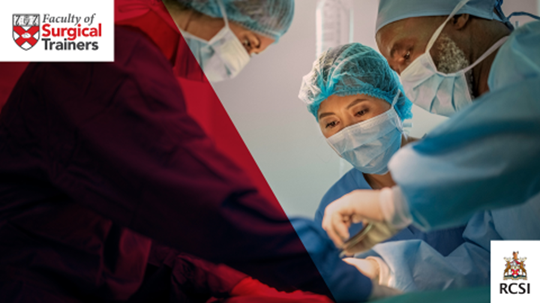Surgical Training is moving to an outcomes-based approach. Whatever your role in training either as a trainer or a trainee the changes will affect you.
The end of training will be when supervisors agree that a trainee is performing at the level of a day one consultant.
The new surgical curriculum for August 2021
What you need to know about the new curriculum

From August 2021, surgical training will become outcomes-based. Trainees will be assessed against the fundamental capabilities required of consultants. The end of training will be reached when supervisors agree that a trainee is performing at the level of a day-one consultant, successfully managing the unselected emergency take, clinics and ward care, operating lists and multi-disciplinary working while demonstrating the generic professional behaviours required of all doctors.
At the heart of these changes is the principle that the knowledge and skills essential for everyday practice should be reflected authentically in the assessment system. The existing curriculum had attracted criticism for relying too heavily on competency-based training with not enough emphasis placed on the holistic professional judgement of clinical supervisors. Because of this, we are introducing a new assessment called the Multiple Consultant Report (MCR) encompassing the new concepts of the Generic Professional Capabilities (GPCs) and Capabilities in Practice (CiPs).
This curriculum change was the result of new standards for curricula introduced by the General Medical Council (GMC); Excellence by design and the Shape of Training Review. It followed a lengthy consultation process with input from trainees and trainers and contributions from a wide range of stakeholders including NHS employers, service and education providers, patient and lay groups, statutory education bodies and experts in curriculum and assessment design. We are very grateful to everyone who has worked with us to make these improvements.
The new curricula are approved by the GMC as the UK framework for surgical training and will also be in use for specialty training in the Republic of Ireland. Training will be truly capability based and, although there will be indicative times in which the great majority of trainees will be expected to complete training, trainees will be able to progress faster through training if they demonstrate the necessary capability.
Whatever your role, trainee or trainer, the curriculum changes will affect you.
You can familiarise yourself with the MCR by downloading the step guide and using the trial MCR. You must be logged into your ISCP account to use it and any data generated through this trial process will not be saved on the ISCP system or impact trainee portfolios. Trainees may also find the general guidance on self-assessment useful before trying out the self-assessment.
How soon will Clinical Supervisors need to start the MCR after the start of the academic year?
The first MCR from August 2021 will be at the midpoint of the placement. It will need to be completed at least 2-3 weeks in advance of the midpoint learning agreement meeting.
At the beginning of the learning agreement, trainee and AES will select a Lead Clinical Supervisor for the MCR before they begin the objective setting meeting. The Lead Clinical Supervisor will be able to start the MCR as soon as the objective-setting meeting has been signed off. The MCR should be completed at least 2 weeks before the midpoint learning agreement meeting. Approximate timings for the MCR and Learning Agreement are shown below.
Key changes
The following key changes are:
- Training will be arranged in phases
- Trainees will be assessed through the MCR
- Generic Professional Capabilities will carry equal weight to CiPs
- Capabilities in Practice will indicate the end-point of training
- Supervision levels indicate when a trainee is ready to complete training
- The learning agreement will focus training on outcomes
- The role of WBAs will be re-balanced
- New transition arrangements will apply
How the new curriculum will benefit Surgical Training
The introduction of this new curriculum will benefit trainees and trainers.
The benefit for trainees is that by being assessed against the standard of a day-one consultant, they and their trainers will be able to better monitor whether they are on track to meet that standard at the end of training.
Trainees will be able to move through training at their own speed and finish early if they acquire the necessary skills faster than the indicative time.
The benefit for Clinical Supervisors will be that the multiple consultant report (MCR) will centre on their professional judgement of trainee performance based on their knowledge of working with trainees rather than on the use of checklists. Training Programme Directors and Assigned Educational Supervisors should also benefit from the information from the MCR to help them monitor trainee needs and progression and tailor the next period of training to specific areas for development identified by the MCR and self-assessment.
What is a Multiple Consultant Report (MCR)?

This is one of the key differences that will impact trainers.
The assessment system is made up of several different types of assessment needed to meet the requirements of the curriculum;
- Workplace-based assessments
- Examinations at key stages
- The ARCP
The MCR will become the primary assessment in the workplace, which, together with the other mandatory assessments, will be used by the trainee’s Assigned Educational Supervisor to make an end of placement report, this will feed into the information presented to the ARCP.
The MCR will take place at the mid-point and end-point of each placement.
The clinical supervisors who work with trainees on a day-to-day basis will assess them against the high-level outcomes of the curriculum.
A trainer will meet with the trainee to discuss the MCR and the self-assessment and agree how to best to develop in the areas identified.
You can familiarise yourself with the MCR by downloading the step guide and using the trial MCR. You must be logged into your ISCP account to use it and any data generated through this trial process will not be saved on the ISCP system or impact trainee portfolios. Trainees may also find the general guidance on self-assessment useful before trying out the self-assessment.
How soon will Clinical Supervisors need to start the MCR after the start of the academic year?
The first MCR from August 2021 will be at the midpoint of the placement. It will need to be completed at least 2-3 weeks in advance of the midpoint learning agreement meeting.
At the beginning of the learning agreement, trainee and AES will select a Lead Clinical Supervisor for the MCR before they begin the objective setting meeting. The Lead Clinical Supervisor will be able to start the MCR as soon as the objective-setting meeting has been signed off. The MCR should be completed at least 2 weeks before the midpoint learning agreement meeting. Approximate timings for the MCR and Learning Agreement are shown below.
Further details on the MCR can be found on the ISCP Website
Training for Trainers
The College will have a training session in November, this will be advertised in advance.
The College would welcome your feedback on the format for ongoing training programme for trainers.
If you would like to submit some suggestions on this issue please email surgicaltrainers@rcsi.ie
For further information for Trainers and a comprehensive list of FAQs please see ISCP FAQs